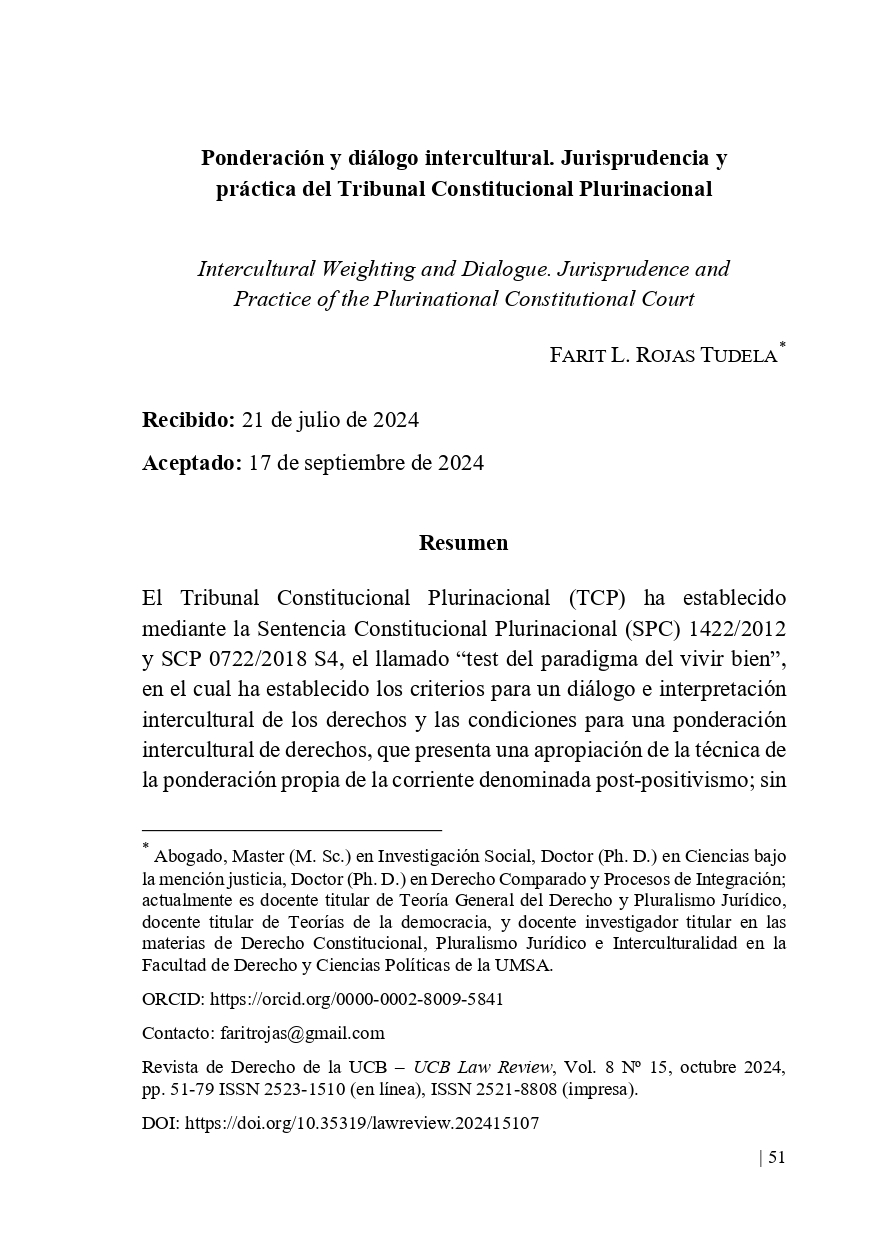Intercultural Weighting and Dialogue. Jurisprudence and Practice of the Plurinational Constitutional Court
DOI:
https://doi.org/10.35319/lawreview.202415107Keywords:
legal pluralism, intercultural interpretation and weighting, intercultural dialogue, principles of indigenous peoples' own lawAbstract
The Plurinational Constitutional Court (TCP) has established through the Plurinational Constitutional Sentence (SPC) SCP 1422/2012 and SCP 0722/2018 S4, the so-called “test of the living well paradigm”, in which it has established the criteria for an intercultural dialogue and interpretation of rights and conditions for an intercultural weighing of rights, which presents an appropriation of the technique of weighing typical of the current called post-positivism; however this appropriation exceeds the modern rationality matrix of this technique and enables the possibility of a different understanding of the pondering from the margins of the so-called “intercultural translation”. This article is based on a theoretical review of the conditions of weighting and, in particular, intercultural weighting, based on the review of the TCP sentences that have developed (in part) the “living well paradigm test”; the findings has been also qualified with conversations which are result of unstructured interviews carried out with officials of the TCP Technical and Decolonization Secretariat, regarding the scope and development of intercultural dialogue that is a necessary condition for intercultural interpretation and weighting.
Downloads
References
Alexy, R. (2019). Ensayos sobre la teoría de los principios y el juicio de proporcionalidad. Palestra.
Alexy, R. (2013). El concepto y la validez del derecho. Gedisa.
Atienza, M. & García Amado, J.A. (2021). Debates iusfilosóficos. Sobre ponderación, positivismo jurídico y objetivismo moral. Palestra.
Combés, I. & Villar, D. (2013). La tierra sin mal. Leyenda de la creación y destrucción de un mito. Revista Tellus, 13(24), 201-225.
Courtis, C. (Ed.). (2006). Observar la ley. Ensayos sobre metodología de la investigación jurídica. Trotta.
de Sousa Santos, B. (2014). Justicia entre saberes: Epistemologías del
Sur contra el epistemicidio. Morata.
de Sousa Santos, B. (2009). Sociología jurídica crítica. Para un nuevo
sentido común en el Derecho. Trotta.
de Sousa Santos, B.; Araújo, S. & Aragón Andrade, O. (2021). Descolonizando el constitucionalismo. Más allá de promesas falsas o imposibles. México: Akal.
Dworkin, R. (2019). Los derechos en serio. Ariel
Dworkin, R. (2008). El imperio de la justicia. Gedisa.
Ferrajoli, L. (2012). Un debate sobre el constitucionalismo. Trotta.
Guastini, R. (2016). Distinguiendo. Estudios de teoría y metateoría del derecho. Gedisa.
Guastini, R. (2014). Otras distinciones. Universidad Externado de Colombia.
Habermas, J. (2008). El discurso filosófico de la modernidad. Katz.
Martinez Dalmau, R.; Storini, C. & Viciano Pastor, R. (2021). Nuevo constitucionalismo latinoamericano. Garantía de los derechos, pluralismo jurídico y derechos de la naturaleza. Olejnik.
Ortiz, E. & Caurey, E. (2011). Diccionario etimológico y etnográfico de la lengua guaraní hablada en Bolivia. Plural.
PADEP/GTZ (2008). Ñande Reko. la comprensión guaraní de la vida buena. https://www.bivica.org/file/view/id/4107
Panikkar, R. (2007). Mito, fe y hermenéutica. Herder.
Pegoraro, L. & Rinella, A. (2016). Derecho constitucional comparado (T. 1). Astrea.
Scarpelli, U. (2021). ¿Qué es el positivismo Jurídico?. Zela.
Serrano, O. H. (2015). Un diálogo en torno a la crisis del positivismo jurídico y el resurgir del pluralismo jurídico. Misión Jurídica, Revista de Derecho y Ciencias Sociales, (8), 171-187.
Tamahana, B. (1993). The Folly of the ‘Social Scientific’ Concept of Legal Pluralism. Journal of Law and Society, (20), 192-217.
Zagrebelsky, G. (2019). Justicia constitucional. Zela.
Constitución Política del Estado [CPE]. 7 de febrero de 2009 (Bolivia).
Declaración Constitucional Plurinacional [DCP] 0130/2017 (29 de noviembre de 2017). Tribunal Constitucional Plurinacional (Bolivia).
Sentencia Constitucional Plurinacional [SCP] 0112/2012 (27 de abril de 2012). Tribunal Constitucional Plurinacional (Bolivia).
Sentencia Constitucional Plurinacional [SCP] 0951/2012 (22 de agosto de 2012). Tribunal Constitucional Plurinacional (Bolivia).
Sentencia Constitucional Plurinacional [SCP] 1422/2012 (24 de septiembre de 2012). Tribunal Constitucional Plurinacional (Bolivia).
Sentencia Constitucional Plurinacional [SCP] 0890/2013 (16 de agosto de 2013). Tribunal Constitucional Plurinacional (Bolivia).
Sentencia Constitucional Plurinacional [SCP] 0260/2014 (12 de febrero de 2014). Tribunal Constitucional Plurinacional (Bolivia).
Sentencia Constitucional Plurinacional [SCP] 0722/2018. Tribunal Constitucional Plurinacional (Bolivia).

Downloads
Published
How to Cite
Issue
Section
License
Copyright (c) 2024 UCB Law Review

This work is licensed under a Creative Commons Attribution-NonCommercial-ShareAlike 4.0 International License.
The U.C.B. Law Review is an Open Access Journal, therefore, it is full free for access, reading, search, dowload, distribution and lawfull reuse in any medium only for non-comercial purposes, provided the original work is properly cited.








